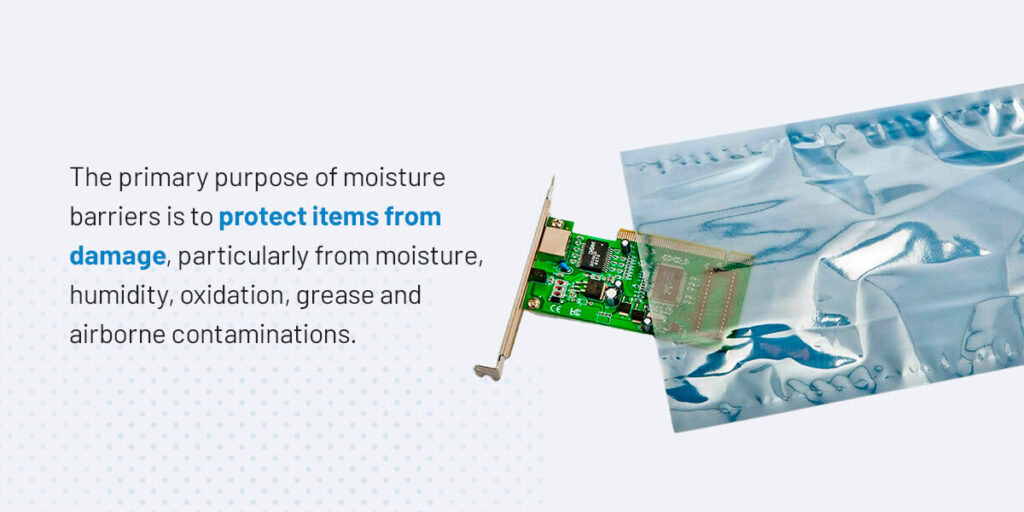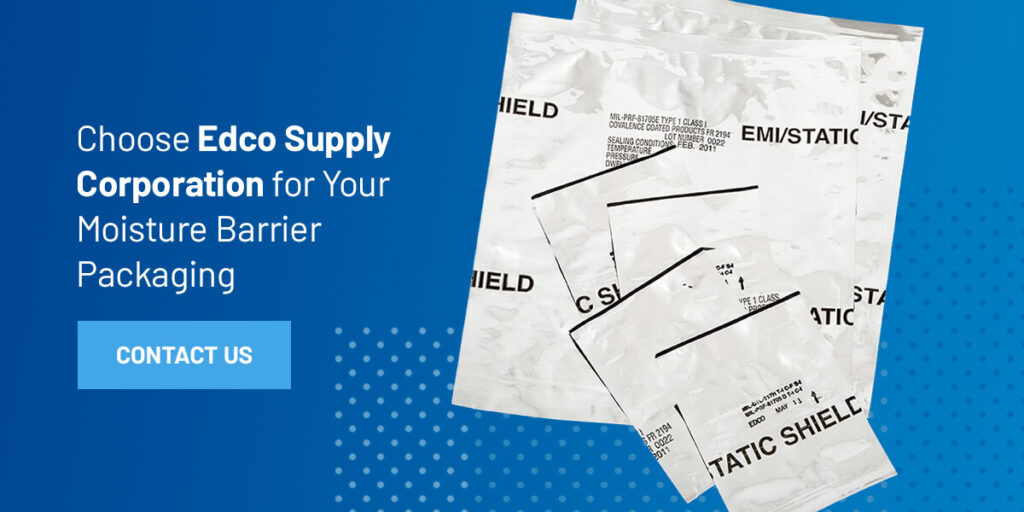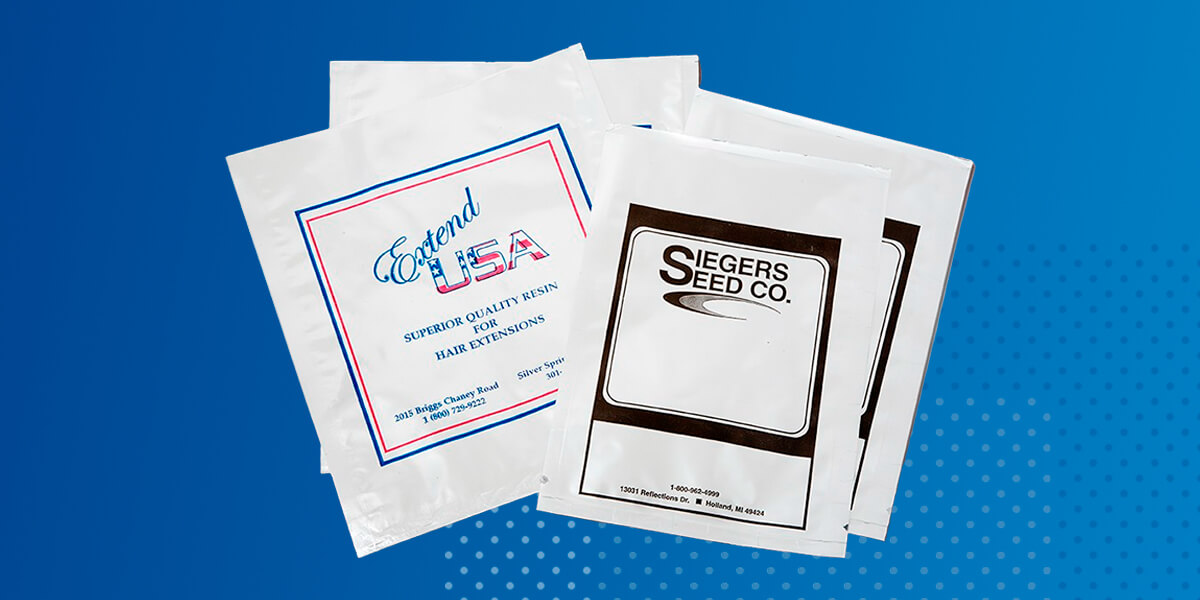Moisture barrier bags, sometimes also called vapor barrier bags, help mitigate the migration of water vapors. Moisture barrier bags are used in the shipping and packaging industry to prevent condensation so moisture doesn’t collect on different products. Moisture barrier bags for packaging and shipping can range in various sizes to accommodate multiple items, including computer equipment, appliances, small products and more.
Below, learn more about water vapor-proof bags and how they can help with your shipping and packaging needs.
The Purpose of Moisture Barrier Bags

The primary purpose of moisture barriers is to protect items from damage, particularly from moisture, humidity, oxidation, grease and airborne contaminations. These bags help preserve products so you can maintain their quality during shipping. Products shipped using moisture barrier bags often have higher stability and longer shelf lives.
Moisture can significantly influence the properties of your products, especially if you’re working with sensitive materials, such as specialty chemicals or highly engineered polymers where moisture content is essential. Moisture barrier bags are used to protect your products until they get to the end user, especially from the development and buildup of mold.
Moisture Barrier Bags vs. Air Barrier Bags
While moisture barrier bags help protect against condensation, oxidation and other issues related to moisture damage, air barrier bags help protect against the migration of air. Air barrier bags are often used when oxidation can cause products to deteriorate, such as in the food industry, where environmental elements can reduce food quality and safety.
However, some moisture barrier bags can also protect against oxidation that degrades product quality. Moisture barrier bags can protect against multiple types of damage, making them ideal for numerous applications and product types. These bags can also protect against corrosion and other damage compromising your products.
What Kinds of Materials Are Used to Make Moisture Barrier Bags?
Moisture barrier bags come in various sizes and shapes to accommodate the different configurations of your products. Moisture barrier bags can also be made from different materials, which help you add additional protection when shipping your products. Some of these materials include:
- Metal and glass sheets
- Aluminum foil
- Metalized film
- Asphalt-coated paper
- Plywood
- Paper-backed aluminum
- Polyethylene
- Polypropylene
While some moisture barrier bags are made from a single material, others are made from a combination of materials, such as polyethylene and foil laminate. Moisture barrier bags, sheets and pouches made of foil, polyethylene or various materials are popular in the shipping and packaging industry because they offer superior, heavy-duty protection. Foil laminate moisture barrier bags can also contain several layers and materials, such as aluminum and polyester.
While there are many options for moisture barrier bags, there are a few popular choices due to their optimal protection and quality:
- Kraft foil moisture bags: These bags feature a layer of Kraft paper and foil, which helps them protect products from moisture and light. These bags are also resistant to grease. Kraft foil bags are suitable if you have concerns about corrosive damage.
- Foil moisture bags: These bags are popular in the packaging industry and help protect products from moisture and oxidation damage. These lightweight bags protect products from moisture, air and light damage. Foil moisture bags can also protect against tears and punctures.
- Static shielding moisture bags: These bags protect against moisture and electrostatic discharges. While these bags can work for multiple products, they’re best suited in environments with static electricity discharges.
While these are the most popular moisture barrier bags, you still have the option to choose different materials to help you protect your products while shipping. Researching the various materials and their protection levels can help you make your decision.
Things to Consider When Choosing Moisture Barrier Bags
There are various factors to consider when choosing moisture barrier bags to ensure they can protect your products:
- Moisture vapor transmission rate (MVTR): The MVTR refers to how much water vapor can pass through a material after a set period. Measuring the MVTR is essential when choosing a moisture barrier bag, so you can ensure it can protect your products against water contamination. Some packaging will need a functional coating or membrane to protect against moisture.
- Amount of desiccant to include: Desiccant is a drying agent that can help absorb additional moisture. You’ll want to consider environmental factors during the packaging and shipping process to determine how much desiccant to include. If you have a lower MVTR, you can reduce how much desiccant to include to keep your shipment free from moisture.
- Purchase price: Another factor to consider is the price of different moisture barrier bags. Some bags cost more depending on the materials they’re made from and the level of protection they offer. While you want to keep your budget in mind, you also want to choose a moisture barrier bag that provides enough protection to maintain the integrity of your products, or you could spend more if they get damaged in transit.
- Electrostatic discharge (ESD): You’ll also want to consider if you need moisture barrier bags that protect against electrostatic discharge. This sudden electrical flow can cause damage to electronic items. Electrostatic discharge occurs more often when the air is dry. Because moisture barrier bags reduce the moisture around a product, you’ll want to consider finding ESD-safe moisture barrier bags.
Choose Edco Supply Corporation for Your Moisture Barrier Packaging

Edco Supply Corporation is a leading supplier of military packaging materials, which are made based on military specification requirements. We also offer commercial moisture barrier packaging to help create a condensation barrier so you can maintain the integrity of your products and extend their shelf lives. We offer fast lead times and turnarounds, helping you stay on schedule with your operations.
When you partner with us, we can help you find last-minute packaging materials or help you stock up for future use. We have many packaging solutions to help you keep your items safe during transport. Contact us to learn more about our products and how they can help you meet compliance requirements while protecting your items.



